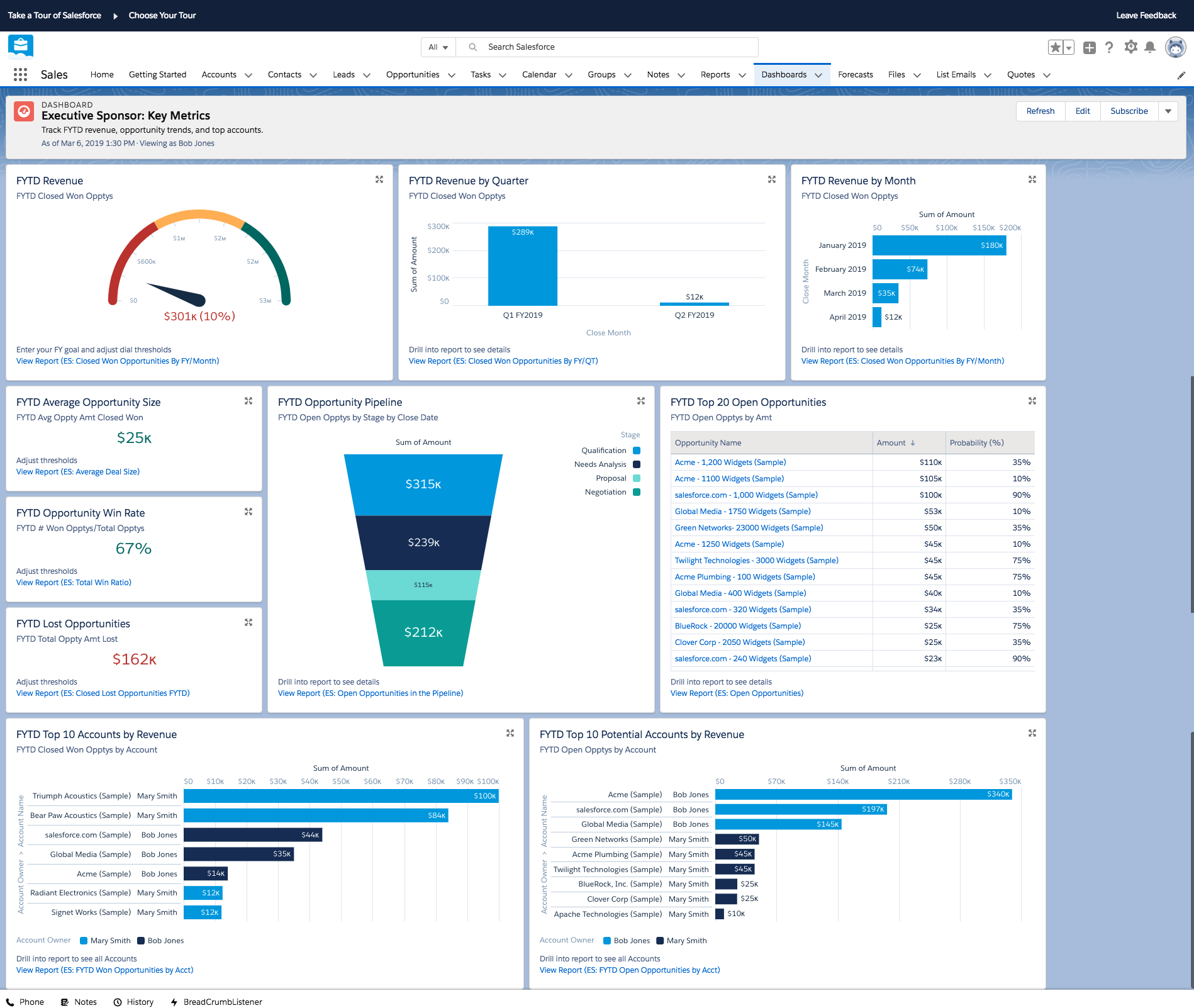In an extremely competitive business landscape, picking the proper customer relationship management (CRM) software is crucial for driving growth and enhancing customer engagement.
Salesforce and Zoho CRM are prominent options catering to various business needs.
Salesforce is known for its powerful features and extensive customization capabilities, making it a top choice for larger organizations with complex requirements.
On the other hand, Zoho CRM offers an accessible and cost-effective solution that appeals to small and medium-sized businesses looking for simplicity without sacrificing functionality.
By evaluating each platform’s strengths and limitations, you can make a strategic decision that aligns with your business goals.
Whether your priority is advanced reporting or ease of use, this guide will help you identify which CRM solution best fits your organization’s needs.
Introduction to Salesforce and Zoho CRM
Before comparing Salesforce with Zoho CRM, we need to lay the groundwork to understand each platform and how it offers value.
Overview of Salesforce CRM
Salesforce CRM is a cloud-based CRM platform that helps businesses improve sales, marketing, and operations.
Businesses using the Salesforce CRM can centralize customer information, incorporate workflow automation, improve team productivity, and work on customer satisfaction.
Salesforce first arrived in 1999 and pioneered the Software-as-a-service (SaaS) model, quickly becoming a staple across various industries.
Since then, Salesforce has been an immovable titan in the CRM space, expanding into various areas, such as marketing automation, customer service, and data analytics.
Salesforce CRM Target Audience
Salesforce’s comprehensive suite and scalability make it ideal for enterprises and large organizations.
Salesforce can handle complex business processes, integrate with various systems, and accommodate many users.
Overview of Zoho CRM
The Zoho CRM is also a cloud-based CRM solution with a comprehensive feature suite that helps businesses manage and improve sales, marketing efforts, and customer support activities.
Zoho is used by businesses that predominantly want an affordable, flexible, and easy-to-use CRM solution.
The Zoho CRM was launched in 2008 and is a popular CRM solution among all business sizes, particularly, small to medium-sized businesses.
Zoho CRM Target Audience
Startups and small- to medium-sized businesses can benefit from Zoho’s affordable pricing, intuitive, easy-to-use interface, and scalability.
Zoho’s plans cater to various business needs and aim to be accessible to different organization sizes and operations.
As you read ahead, you’ll learn the main differences between both platforms and how they can influence which CRM you pick.
Why Compare Salesforce and Zoho?
The CRM market has never been more competitive, fueled by high demand and various powerful options.
Salesforce and Zoho are two of the most prominent players in the CRM space.
Each has its features, strengths, and target markets. Comparing Salesforce and Zoho is essential because:
- Several CRM options are available from different vendors, pushing the other to introduce innovative features and offer the best possible product.
- CRM vendors are introducing similar features and functionality, forcing competitors to do the same, but better.
- Each industry has unique requirements, and different CRM options align with these unique business requirements and processes.
- Businesses can grow quicker than before, forcing CRM vendors to improve their offerings to remain competitive.
Key Consideration When Comparing Salesforce and Zoho
A practical comparison needs parameters to distinguish between both options. The essential considerations for Salesforce vs Zoho include:
- Comparing the pricing models, upfront costs, monthly fees, and additional charges for specific features.
- Assess the CRM’s scalability and ability to accommodate future growth and increasing user numbers.
- Determine the extent of customization required to tailor the CRM to specific business needs.
- Consider how easily the CRM integrates with other business applications, such as marketing automation, email, and accounting software.
- Compare the user interface, ease of use, and overall user experience.
- Assess the quality and responsiveness of customer support.
Core Features Comparison
This table compares Salesforce with Zoho CRM in three essential areas: usability and interface, automation and workflows, and reporting and analytics.
This table expands on this:
| Feature | Salesforce | Zoho CRM |
|---|---|---|
| Usability and Interface | ||
| Intuitive Navigation and UI Design | User-friendly interface with customizable dashboards | Clean and intuitive interface, easier to navigate |
| Learning Curve | A steeper learning curve, especially for complex configurations | Relatively easier to learn and use |
| Automation and Workflows | ||
| Process Builder and AI | Powerful automation capabilities with AI-driven insights | Blueprint for workflow automation and Zia AI Assistant for basic automation |
| Suitability for Task Automation | Highly suitable for complex automation scenarios | Ideal for basic to intermediate automation needs |
| Reporting and Analytics | ||
| Dashboard and Advanced Analytics | Robust reporting and analytics capabilities with advanced customization options | Simplified reporting tools suitable for basic analytics |
Ecosystem and Integrations
Both platforms build an ecosystem of services that work in tandem with their CRMs to operate as a single solution for various business processes.
This table compares the ecosystems and third-party integration support for Salesforce vs Zoho CRM:
| Feature | Salesforce | Zoho CRM |
|---|---|---|
| Ecosystem and Integrations | ||
| AppExchange | Extensive library of third-party apps and integrations | Integration with Zoho Books, Zoho Projects, and limited third-party integrations |
| Cross-platform Compatibility | Integrates seamlessly with Slack, Tableau, and other popular tools | Compatible with some popular third-party tools |
| Data Sync and Interoperability | ||
| Data Synchronization | Robust data synchronization capabilities, especially with other Salesforce products | Simpler data synchronization, often requiring manual intervention for complex scenarios |
Pricing and Value Proposition
CRM pricing is a primary determinant that sways the final decision because it is an expense that influences the bottom line.
Here’s how both platforms differ in terms of pricing strategy:
| Feature | Salesforce | Zoho CRM |
|---|---|---|
| Pricing Tiers | ||
| Pricing Model | Subscription-based, tiered pricing | Subscription-based, tiered pricing |
| Target Market | Enterprises, large organizations | SMBs, startups |
| Total Cost of Ownership | ||
| Hidden Costs | Potential for additional costs due to customization, integration, and support | Lower total cost of ownership, often with fewer hidden costs |
Several modules within each platform’s product offerings influence their final pricing.
Businesses must compare pricing and features to ensure they find the best value for their money.
Pros and Cons: Salesforce vs. Zoho
Salesforce and Zoho are powerful CRMs with strengths and weaknesses influencing business decision-making.
This section lists the strengths and weaknesses of Salesforce and Zoho, as these tables show:
Salesforce Strengths and Weaknesses
Here’s where Salesforce excels and falls short on:
| Strengths | Weaknesses |
|---|---|
| Advanced Features | Complex to implement and configure |
| Scalability | Higher Cost |
| Integration Capabilities | Steeper Learning Curve |
| Strong Ecosystem | – |
Zoho Strengths and Weaknesses
Here’s where Zoho excels and falls short on:
| Strengths | Weaknesses |
|---|---|
| Cost-Effective | Limited Advanced Features |
| User-Friendly | Weaker Ecosystem |
| Integrated Suite | Scalability Issues for Large Organizations |
Balancing Features and Budget
Critical Considerations for Different Business Sizes:
Small Businesses:
- Focus on core CRM features like sales, marketing, and customer service.
- Prioritize ease of use and look for intuitive interfaces and minimal setup.
- Consider cost-effectiveness, i.e., Zoho’s affordable plans might be more suitable.
Medium-Sized Businesses:
- Balance features and cost and look for a solution that offers a good mix of features and affordability. May also need to engage developers for implementing custom workflows and integrations to support growth effectively.
- Consider scalability when picking a platform that grows with your business.
- Evaluate integration capabilities to ensure seamless integration with other business tools.
Large Enterprises:
- Prioritize advanced features like robust automation, analytics, and customization options.
- Pick a platform that can handle large user bases and complex workflows.
- Evaluate support and security to ensure strong support and security measures.
Conclusion
The choice between Salesforce and Zoho CRM hinges on your business’s unique needs and budget.
Salesforce stands out with its powerful features, extensive customization options, and robust analytics, making it a strong fit for larger organizations that require a comprehensive CRM solution.
Its ability to scale and integrate with other systems makes it a top contender for businesses harnessing complex functionalities.
On the other hand, Zoho CRM provides a more affordable and user-friendly alternative, ideal for small and medium-sized businesses.
Its intuitive interface and essential features allow teams to get up and running quickly without the steep learning curve.
By carefully considering your organization’s size, budget, and specific requirements, you can confidently choose the CRM platform that best supports your business objectives.
FAQs
Which CRM is better than Zoho?
Salesforce is better than Zoho because of its advanced features, functionality, and various customization options.
Does Netflix use Zoho CRM?
No, there is no solid evidence that Netflix uses Zoho.
Is Zoho an ERP or CRM?
Zoho is a CRM solution but offers ERP functionality through different applications and integrations.

Navaid Ahmed
Director Of Engineering at Folio3 Software | Head of Product Management
Navaid Ahmed is a Seasoned Salesforce CRM expert, who brings a wealth of experience in optimizing sales processes, enhancing customer relationships, and driving business growth. With a deep understanding of Salesforce's capabilities, Navaid specialize in crafting tailored solutions that empower organizations to streamline operations, boost productivity, and achieve their sales objectives.

